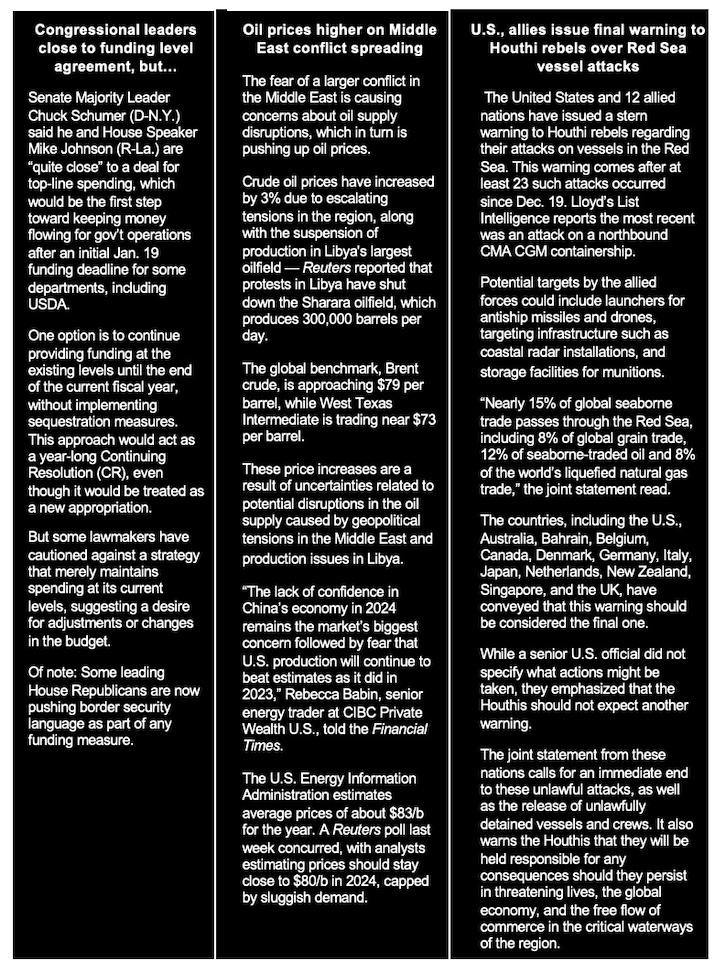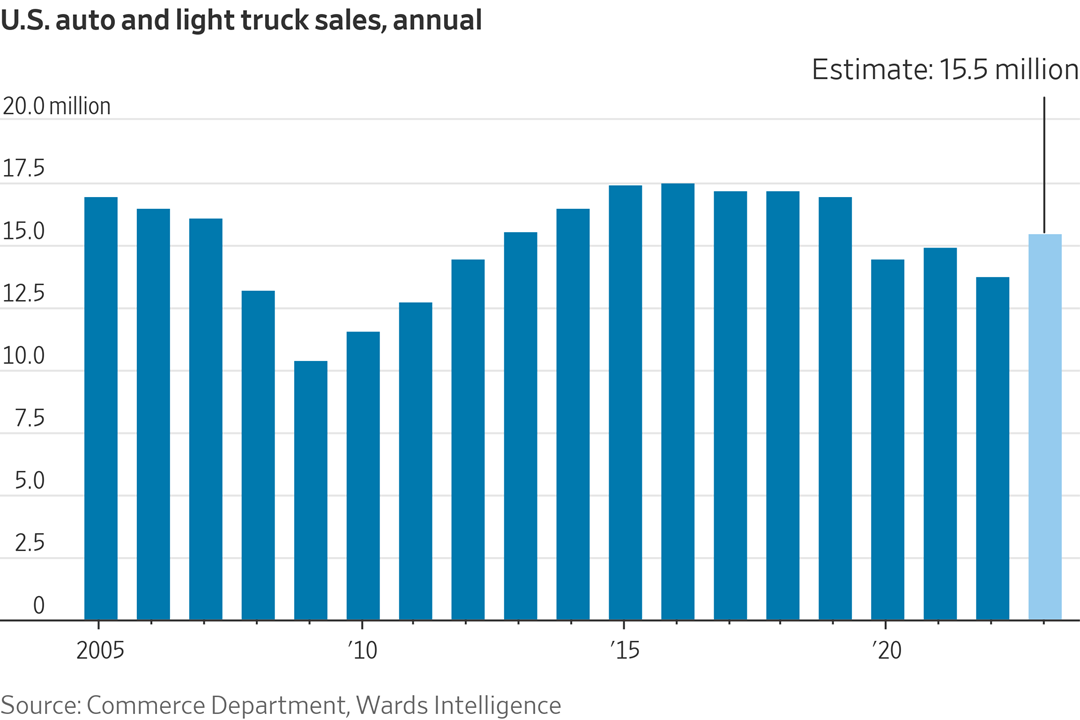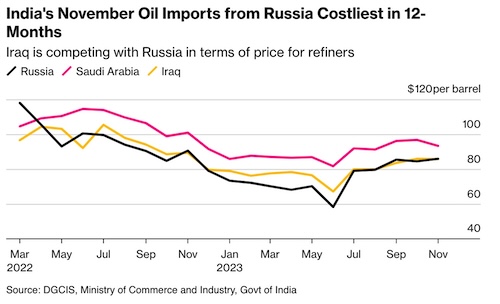Risk of Gov’t Shutdown Increasing as House Conservatives Link Border Issues with Funding

Oil price volatility returns on fears of escalating Red Sea conflict | Pig antibiotic in focus

|
Today’s Digital Newspaper |
MARKET FOCUS
- Oil prices higher on fears of Middle East conflict escalation
- U.S., allies issue final warning to Houthi rebels over Red Sea vessel attacks
- International shipping firms continue to reroute vessels around Cape of Good Hope
- Cal-Maine Foods said it lost about 3% of its total flock to bird-flu outbreaks in Kansas
- General Motors announces best year for vehicle sales since 2019
- FOMC minutes: Fed cautious on rate cuts amid inflation concerns
- Americans filing for unemployment benefits sank 18,000 to 202,000 last week of 2023
- U.S. bankruptcies surge 18% in ‘23 amid rising interest rates, stricter lending standards
- In 2023, Texas remained top destination for Americans relocating to a different state
- Japan earthquake may delay BOJ's monetary policy exit
- India's November crude oil imports from Russia hit 1-year cost high
- Ag markets today
- Sugar futures recovering from 11-month low of 20.24 reached Dec. 21.
- Smaller Thai rice exports expected
- Indonesia raises industrial sugar import quota
- Ag trade update
- NWS weather outlook
- Pro Farmer First Thing Today items
CONGRESS
- Risk of U.S. gov’t shutdown increasing
- Top Democratic priority: Bipartisan deal on tax cuts and child tax credit
- House Homeland Security panel to hold hearing On Mayorkas impeachment next week
ISRAEL/HAMAS CONFLICT
- Israel in talks with several countries to relocate Gazans
- Iranian leaders vow revenge for pair of bombings
RUSSIA & UKRAINE
- Russia planning to buy short-range ballistic missiles from Iran
PERSONNEL
- U.S. gov’t officials' approval ratings: Key takeaways from December Gallup poll
- Supreme Court Justice Sonia Sotomayor's wealth soars
CHINA
- China’s services sector picks up pace on optimism for economic recovery
- China steps up aid for regional banks as economic risks mount
- China targets better integration of EVs, grids to manage power demand
- China emphasizes commitment to advancing agricultural technology
- China targets better integration of EVs, grids to manage power demand
LIVESTOCK, NUTRITION & FOOD INDUSTRY
- Controversial pig antibiotic remains in U.S. food supply
HEALTH UPDATE
- Bayer’s stem-cell treatment for Parkinson’s disease succeeded in early trial
POLITICS & ELECTIONS
- Pressure mounts for Supreme Court to rule on Trump's eligibility for public office
- CNN to host Republican presidential town halls
- In op-ed, Trump promises to reverse Biden border policies, step up deportations
OTHER ITEMS OF NOTE
- Biden administration files lawsuit against Texas regarding its immigration law
- Court in Argentina suspended some proposed reforms
|
MARKET FOCUS |
— Equities today: Asian and European stock markets were mixed to weaker overnight. U.S. Dow opened around 40 points higher and is currently around 200 points higher. In Asia, Japan -0.6%. Hong Kong -0.1%. China -0.4%. India +0.7%. In Europe, at midday, London +0.2%. Paris +0.3%. Frankfurt +0.1%.
U.S. equities yesterday: The Dow ended down 284.85 points, 0.76%, at 37,430.19. The Nasdaq fell 173.73 points, 1.18%, at 14,592.21. The S&P 500 lost 38.02 points, 0.80%, at 4,704.81.
— Cal-Maine Foods, the U.S. egg company, reported late Wednesday a sharp decline in quarterly earnings and said it lost about 3% of its total flock to bird-flu outbreaks in Kansas. Shares fell more than 5% in off-hours trading.
— General Motors announced its best year for vehicle sales since 2019, with the company reporting the sale of 2.6 million vehicles in 2023, marking a 14.1% increase compared to 2022. This performance aligns with industry expectations. However, GM's electric vehicle (EV) sales for the year were disappointing, as EVs accounted for just 2.9% of the company's total sales, with a majority being now-discontinued Chevrolet Bolt models. In response, GM has plans to increase its EV production for 2024 and is offering $7,500 in incentives for models that no longer qualify for $7,500 in federal tax credits.

— Agriculture markets yesterday:
- Corn: March corn rose 1 1/2 cents to $4.65 1/4 and closed near the session high.
- Soy complex: March soybeans rose 3 1/2 cents to $12.77 after hitting a six-month low early on and closed nearer the session high. March soybean meal gained 90 cents at $380.40 and nearer the session high. Prices hit a 2.5-month low early on. March bean oil closed up 31 points at 48.60 cents and nearer the session high.
- Wheat: March SRW fell 6 1/2 cents to $6.00 1/4, a low-range close, while March HRW fell 7 1/2 cents to $6.21 1/2. March spring wheat closed 6 1/2 cents lower at $7.08 1/2.
- Cotton: March cotton rose 99 points at 80.93 cents and nearer the session high.
- Cattle: Cattle futures recovered from early losses, with February live cattle closing down just 7.5 cents at $171.85. Expiring January feeder cattle rose 65 cents to $226.07, while most-active March gained 57.5 cents to $227.025.
- Hogs: February lean hog futures traded on both sides of unchanged before settling 2.5 cents lower to $65.30.
— Ag markets today: Corn, soybeans and wheat traded in narrow ranges during a quiet overnight session. As of 7:30 a.m. ET, corn futures were trading fractionally lower, soybeans were 2 to 3 cents lower, winter wheat markets were 3 to 4 cents lower and spring wheat was around a penny lower. Front-month crude oil futures were about 85 cents higher, and the U.S. dollar index was about 180 points lower this morning.
Early signs point to another rise in cash cattle prices. Initial cash cattle trade started around $175.00 in the far northern market. While volume was light, that suggests the broader tone in cash cattle trade will be higher for a third straight week. February live cattle futures finished Wednesday 39 cents below last week’s average cash price of $172.24.
Cash hog index ticks up. The CME lean hog index rose 14 cents to $65.19 (as of Jan. 2). It will take more than one modest daily price gain to convince traders the seasonal low is in place, though this could trigger some buyer interest. February lean hog futures finished Wednesday at an 11-cent premium to the cash index.
— Of note:
- “International shipping companies continue to reroute their vessels around the Cape of Good Hope, adding significant cost and weeks of delay to the delivery of goods, and ultimately jeopardizing the movement of critical food, fuel, and humanitarian assistance throughout the world.” — A coalition statement aimed at Houthi Yemeni rebels.
- 1 million: Estimated amount of packages that e-commerce sellers Shein and Temu each ship per day in the U.S., according to parcel-shipping consultant ShipMatrix.
- South of the border. “Yes, it’s very nice that they have a trip to the border. But the only way to solve this is here, working in a bipartisan way with Senate Republicans, Senate Democrats and House Democrats to get it done, period. And I hope the speaker will realize that.” — Senate Majority Leader Chuck Schumer (D-N.Y.). House Speaker Mike Johnson (R-La.), who called the situation an “unmitigated disaster,” led a delegation of more than 60 House Republicans to Eagle Pass, Texas, where they toured a Border Patrol processing facility and spoke with local residents and sheriffs.
— FOMC minutes: Fed cautious on rate cuts amid inflation concerns. The Federal Open Market Committee (FOMC) minutes from the December meeting indicate that while the Fed is close to the point of ending rate increases, there is still uncertainty regarding when rate reductions may start. The minutes highlight that the Fed remains focused on reducing inflation but admits that progress has been made. While the policy rate is considered "restrictive," there is no clear timeline for rate cuts, and officials stress that the actual policy path will depend on how the economy evolves. The Fed is cautious about inflation risks and wants to see more evidence that inflation pressures are abating before considering rate cuts. The minutes also mention concerns about softer consumer spending, commercial real estate, and increased household credit usage. Overall, the Fed appears to be done raising rates but is not yet ready to publicly state a specific timeline for rate reductions, preferring to wait for more data.
Market impact: Bond markets shrugged off the Fed news, with rates falling slightly: The 10-year Treasury yield declined by 0.039 percentage point to 3.905%. Market watchers focused on a more hawkish message in the minutes that the prime lending rate would remain high “for some time,” lowering hopes for a first-quarter cut. This morning, the odds traders were placing on a March rate cut fell to 76%, down from 96% at the start of the week. The first cut is now fully priced in for May.
— Number of Americans filing for unemployment benefits sank by 18,000 to 202,000 in the last week of 2023, firmly below market expectations of 216,000 to mark the lowest claim count since October. In the meantime, continuing claims fell by 31,000 to 1,885,000 in the earlier period, signaling that individuals are having an easier time finding new employment. The data matched other recently released gauges in underscoring the historical tightness of the U.S. labor market, adding leeway for the Federal Reserve to prolong its hawkish stance into 2024, if necessary, to lower inflation.
— U.S. bankruptcies surge 18% in 2023 amid rising interest rates and stricter lending standards. In 2023, bankruptcies in the United States increased by 18%, with several factors contributing to this rise. These factors included higher interest rates, stricter lending standards, and the gradual reduction of pandemic-related financial assistance. The year saw a total of 445,186 bankruptcy filings, compared to 378,390 in 2022.
Commercial Chapter 11 bankruptcy filings saw a significant increase, rising by 72% from 3,819 in 2022 to 6,569 in 2023, according to data from Epiq AACER. Overall commercial filings also showed an uptick, reaching 25,627 in 2023 compared to 21,479 in 2022. Epiq AACER's Vice President, Michael Hunter, anticipates that the trend of increasing consumer and commercial bankruptcy filings will continue in 2024. This projection is attributed to factors such as the phasing out of pandemic stimulus measures, higher funding costs, elevated interest rates, growing delinquency rates, and historically high levels of household debt.
Despite the rise in bankruptcies, the numbers remained below pre-pandemic levels, indicating that while the situation has escalated, it has not yet reached the levels seen before the Covid-19 pandemic.
— In 2023, Texas remained the top destination for Americans relocating to a different state, as reported in U-Haul's annual Growth Index Report. The Growth Index measures the net gain of one-way U-Haul truck rentals arriving in a state during a calendar year. This marks the third consecutive year that Texas has ranked first in attracting the most movers, with Florida coming in second place. North Carolina, South Carolina, and Tennessee also made the list of states that gained a significant number of new residents.
Conversely, California experienced the most one-way U-Haul trucks leaving the state.
U-Haul's Growth Index is based on over 2.5 million moving transactions annually, reflecting a state's ability to attract new residents. However, it may not directly correlate with population or economic growth.
— Recent earthquake in Japan is causing potential delays in the Bank of Japan's (BOJ) exit from its ultra-easy monetary policy. BOJ Governor Kazuio Ueda stated that he is not in a rush to unwind the policy and mentioned a shift away from Japan's sustained low-growth, low-inflation period in 2023. While Ueda did not address monetary policy direction, he emphasized the BOJ's commitment to maintaining sound banking and funding conditions in the earthquake-affected areas. Initially, some expected policy changes to occur in January, but with slower economic data and the earthquake's impact, expectations for policy adjustments are now being pushed to March or April.
Market perspectives:
— Outside markets: The U.S. dollar index was weaker as most foreign rival currencies were higher versus the greenback. The yield on the 10-year U.S. Treasury note was firmer, around 3.97%, with a mostly higher tone in global government bond yields. Crude oil futures were moving higher ahead of U.S. gov’t inventory data that was delayed a day by the Monday holiday. U.S. crude was around $73.30 per barrel and Brent was around $78.80 per barrel. Gold and silver were higher ahead of US market action, with gold around $2,054 per troy ounce and silver was around $23.20 per troy ounce.
— India's November crude oil imports from Russia hit 1-year cost high. In November, India's crude oil imports from Russia were the most expensive in a year, according to government data. This increase in cost reflects a decrease in discounts on the fuel. Refiners in India, which is the world's third-largest oil consumer, paid an average of $85.90 per barrel for shipments from Russia, representing a 1.8% rise compared to the $84.46 per barrel in October. During the same period, barrels of crude oil from Iraq and Saudi Arabia, India's second and third-largest suppliers, were priced at $85.70 and $93.30 per barrel, respectively. These prices remained relatively high, even as benchmark crude oil prices were trending lower. Less attractive discounts, rather than payment bottlenecks, compelled refiners to seek alternative crude oil sources, India’s Oil Minister Hardeep Singh Puri said on Wednesday. While India’s imports from Russia rose 6.2% on month to 1.68 million barrels a day in November, those from Iraq grew by 21.4% crossing the 1 million mark for the first time since February, according to data intelligence provider Kpler.

Source: Bloomberg
— Sugar futures have seen a slight increase, trading near 21 cents per pound, recovering from an 11-month low of 20.24 reached on Dec. 21. This uptick comes because of reduced rainfall in crucial sugar-growing regions of Brazil, which has slowed down the surge in supply from the world's leading sugar producer and exporter. Besides Brazil's weather conditions, dry weather in India, caused by El Niño, has negatively impacted yields and led the government to impose restrictions on foreign sales from the country, contributing to the reduction in sugar supply. Prices have also been influenced by rising energy prices due to concerns about trade disruptions through the Suez Canal, which in turn, has increased demand for biofuel alternatives. The profitability of sugar ethanol has prompted producers to allocate more sugarcane for biofuel blending rather than sugar production, further constraining sugar supply. But despite these factors supporting sugar prices, robust production during the final quarter of 2023 and reduced congestion in Brazilian ports have kept prices relatively close to recent lows.
— Smaller Thai rice exports expected. Thailand expects to export 7.5 MMT of rice this year, the Thai Rice Exporters Association said. That would be down 1 MMT (11.8%) from last year.
— Indonesia raises industrial sugar import quota. Indonesia set this year’s sugar import quota at 4.77 MMT for industrial use, a trade ministry official said, up from 3.6 MMT in 2023. The sugar import quota for household use is set at 708,609 MT in 2024, compared with last year’s 991,000 MT level.
— Ag trade update: South Korea purchased 68,000 MT of corn expected to be sourced from the U.S., South America or South Africa and tendered to buy 50,000 MT of U.S. milling wheat.
— NWS weather outlook: Snow expected for portions of the Four Corners region and adjacent High Plains Thursday... ...Showers and thunderstorms with some locally heavy rainfall forecast from Texas late Thursday into the Southeast Friday with storm system traversing the Gulf Coast... ...Series of Pacific storm systems will keep low-elevation/coastal rain, interior wintry mix, and high elevation mountain snow in the forecast for the Pacific Northwest, Northern Rockies, and Great Basin.

Items in Pro Farmer's First Thing Today include:
• Grains favor downside in quiet overnight trade
• China targets better integration of EVs, grids to manage power demand
|
CONGRESS |
— Risk of a government shutdown is increasing as Senate and House conservatives demand border security measures in exchange for funding the government. They are pushing for stricter border control to address the flow of migrants into the country, citing concerns about the southern border's security.
Key reason: While the government shutdown deadline for military construction, Veterans Affairs, Agriculture, Energy, Transportation, and Housing and Urban Development is set for Jan. 19, the rest of the government must be funded by Feb. 2. Conservatives are looking to attach major border security reforms to regular government funding legislation because it appears that the emergency package containing aid for Ukraine and Israel will not move forward soon.
Senate Democrats oppose some of the border measures proposed by House conservatives, setting the stage for a potential showdown. Merging border security negotiations with government funding discussions could further complicate the situation, making it challenging to reach an agreement.
— A top Democratic priority: A potential bipartisan deal in Congress involving the extension of certain 2017 tax cuts in exchange for strengthening the child tax credit. President Biden opposes extending tax cuts that primarily benefit the wealthy, which are set to expire soon, as part of his re-election argument against former President Donald Trump. A group of lawmakers, including Senate Finance Committee Chairman Ron Wyden (D-Ore.) and House Ways and Means Committee Chairman Jason Smith (R-Mo.), are working on a framework for a $100 billion bill. Half of the funding would come from restoring certain Republican-favored tax breaks, and the other half would go toward enhancing the child tax credit. But details on how to pay for the bill and whether to pass it as standalone legislation or attach it to another important bill are still unresolved.
Democrats temporarily increased the child tax credit’s value in 2021 from $2,000 to up to $3,600 a year per child and allowed taxpayers to receive it in monthly instead of yearly installments, but the expanded credit lapsed the following year.
President Biden appears to be on board with the discussions, at least in theory, the Washington Post reports. “If Congress brings back tax cuts for big corporations, it should restore the child tax credit that helped cut child poverty nearly in half,” a White House official told the newspaper.
The broader issue of extending Trump's tax cuts, which expire in 2025, is also looming, with some Democrats urging their party to seek a better deal than in the past.
— House Homeland Security Committee to hold hearing On Mayorkas impeachment next week. Reuters reports (link) that on Wednesday, the GOP-led House Homeland Security Committee announced it will advance an effort next week to impeach Homeland Security Secretary Mayorkas “over allegations he has been derelict in his duty of managing the U.S.-Mexico border.” Specifically, the Committee indicated it will hold a hearing on Jan. 10 “related to the impeachment allegations with witnesses to be announced in the coming days.” Punchbowl News was the first to report the hearing.
|
ISRAEL/HAMAS CONFLICT |
— Israel's government is in talks with several countries, including the Democratic Republic of the Congo, to relocate Gazans in the wake of Israel's invasion of the Gaza Strip, The Times of Israel reported on Jan. 3. The day before, the United States criticized Israeli Finance Minister Bezalel Smotrich's statement that the war will enable Israel to "encourage" the migration of Gazans out of the region.
— Iranian leaders vowed revenge for a pair of bombings that killed dozens of people a day earlier in the country’s southeast, but they stopped short of blaming domestic militants or Israel for the biggest attack in decades.
|
RUSSIA/UKRAINE |
— Russia is planning to buy short-range ballistic missiles from Iran, a step that would enhance Moscow’s ability to target Ukraine’s infrastructure at a critical moment in the conflict, U.S. officials said. Link to details via the Wall Street Journal.
|
PERSONNEL |
— U.S. government officials' approval ratings: Key takeaways from December Gallup poll. The job approval ratings of various top U.S. government officials are based on a Gallup poll conducted in December. Here are the key points (link for details):
- No major U.S. government official currently enjoys majority job approval from the American public.
- Chief Justice John Roberts of the Supreme Court has the highest approval rating at 48%, followed closely by House Democratic Leader Hakeem Jeffries at 46%.
- Senate Republican Leader Mitch McConnell has the lowest approval rating at 27%, with President Joe Biden not far ahead at 39%.
- Other key officials in both legislative and executive branches have approval ratings ranging from 40% to 45%.
- Chief Justice Roberts and Federal Reserve Chairman Jerome Powell have seen the most significant declines in their approval ratings since 2021.
- Strong partisan differences exist in the approval ratings, with Republicans generally approving more of Republican leaders and Democrats favoring Democratic leaders.
- Overall, there is no unifying figure with broad bipartisan support among the current leadership in the White House, Congress, or the Supreme Court.
Despite the low approval ratings for individual leaders, Americans generally rate these leaders more favorably than the institutions they represent, such as the Supreme Court and Congress.
— Supreme Court Justice Sonia Sotomayor's wealth soars: From modest beginnings to multimillionaire. Justice Sonia Sotomayor, who became the first Latina on the Supreme Court in 2009, has seen her wealth increase substantially since taking office. Her estimated net worth has grown from around $750,000 to $5 million. “This story is yet another installment in a series about the nine Supreme Court justices and their finances,” says Forbes general assignment reporter Kyle Mullins. “Each one is a multimillionaire, but Sotomayor, unlike some others, didn't start out that way — she grew up in poverty and made most of her money after joining the court. Her story is a window into both the American Dream and the ways public servants can cash in on their fame.” (Link to article.) This increase in wealth is attributed to several factors:
- Book deals: Sotomayor's fame as a Supreme Court justice has led to lucrative book deals, earning her $3.8 million in earnings since joining the court.
- Real estate investments: Her real estate investments have paid off, with her Manhattan apartment now worth an estimated $1.4 million and her Washington, D.C. home also appreciating in value.
- Supreme Court pension: Supreme Court justices receive salaries for life after turning 65, and Sotomayor, who turned 65 in June 2019, is guaranteed her current salary of $285,400 for the rest of her life, estimated to be worth $2.3 million.
|
CHINA UPDATE |
— China expands nuclear power while U.S. lags behind. China has been significantly expanding its nuclear power capacity by adding 37 new reactors in the last decade, making it the world's second-largest economy in this regard. In contrast, the United States has been closing older nuclear power plants and has been slow to build new ones. Over the past 30 years, only one new nuclear power plant has been opened in the US. This divergence in nuclear power development is due to concerns about safety and costs associated with nuclear energy in the U.S., while China has been aggressively pursuing nuclear energy as part of its energy strategy. Link to more via the Washington Times.
— China's December Service PMI hits 52.9, strongest expansion in 12 months. In December 2023, the Caixin China General Service PMI rose to 52.9 from November's 51.5, surpassing market expectations of 51.6. This marked the 12th consecutive month of growth in services activity and the fastest expansion since July. The boost in activity was primarily driven by a significant increase in new business. New orders experienced their strongest growth in seven months, with export orders rising for the fourth consecutive month, reaching their highest level since June.
Additionally, employment in the services sector increased for the first time in three months, while backlogs of work remained unchanged after 16 consecutive months of growth. On the cost side, input price inflation reached its highest point since July due to increased raw material prices and labor costs. In contrast, output cost inflation decreased to a four-month low as businesses made efforts to attract demand and secure new business.
Furthermore, sentiment in the services sector improved to a three-month high, reflecting optimism about stronger economic conditions and increased customer spending. But this sentiment remained below the series average.
Bottom line: The data indicates a positive trend in China's services sector, with increased activity and expectations for future growth.
— China steps up aid for regional banks as economic risks mount. Record $31 billion in special-purpose bonds used to stabilize small lenders exposed to property crisis. Link/paywall to Financial Times article.
— China emphasizes commitment to advancing agricultural technology. China's Ministry of Agriculture and Rural Affairs has reaffirmed its commitment to embracing advanced agricultural technology to enhance crop productivity and ensure a stable food supply. They expressed their determination to utilize all available resources to accelerate the adoption of new technologies, with a particular emphasis on improving soybean yields and agricultural machinery for hilly and mountainous regions. Additionally, China plans to establish a scientific and technological innovation strategic advisory committee to guide decision-making related to major agricultural technology strategies, plans, and policies.
— China targets better integration of EVs, grids to manage power demand. China's state planner has issued new rules on strengthening the integration of new energy vehicles with the electric grid, as the world's biggest market for electric vehicles (EVs) aims to manage its power demand amid a transition to renewable energy. Link to Reuters item for details.
|
LIVESTOCK, NUTRITION & FOOD INDUSTRY |
— Controversial pig antibiotic remains in U.S. food supply. Eight years ago, U.S. regulators acknowledged a mistake (link) regarding an antibiotic called carbadox that was approved for use in pigs in 1972. This drug, which is administered to animals Americans consume as lunchmeat and hot dogs, is now raising concerns about potential carcinogenic residues, according to a Bloomberg account. Originally, regulators believed that the residues of carbadox wouldn't pass on to humans and pose a cancer risk. However, in the early 2000s, an international committee found flaws in the testing method used to make this assumption. The U.S. Food and Drug Administration (FDA) confirmed the same in 2016.
Despite evidence that removing carbadox from the market would reduce consumers' lifetime cancer risk, the drug is still in use in the US. Carbadox is banned in Europe and Canada, but Phibro Animal Health Corp., which sells it as Mecadox, has resisted efforts to withdraw it from the market.
In November, the FDA announced plans (link) to revoke the testing method used to determine carbadox residues' impact on humans and withdraw approval for the drug. Although this isn't the FDA's first attempt to remove carbadox, it's part of a lengthy process. Phibro continues to assert the safety of carbadox.
While the FDA's recent move suggests readiness to eliminate carbadox from the food chain, Phibro is expected to challenge this decision, potentially prolonging the process. The FDA hasn't explicitly advised against eating pork during this period but suggested alternative protein sources.
|
HEALTH UPDATE |
— Bayer said its stem-cell treatment for Parkinson’s disease succeeded in an early trial. Shares climbed around 2% in Frankfurt.
|
POLITICS & ELECTIONS |
— Pressure mounts for Supreme Court to rule on Trump's eligibility for public office. The Supreme Court is facing increasing pressure to address the issue of whether former President Donald Trump can be disqualified from holding public office due to his involvement in the Jan. 6, 2021, Capitol riot.
Trump cited his use of the word “peaceful” in several statements that day to rebut findings by Colorado courts that he engaged in insurrection by encouraging a mob of his supporters to attack the Capitol. Trump also argued that it is for Congress rather than state courts to determine whether Section 3’s conditions are met and that the president shouldn’t be classified as an officer of the U.S. for 14th Amendment purposes.
Trump has formally petitioned the Supreme Court to overturn Colorado's state ruling that removed his name from the state's 2024 ballot under the 14th Amendment's "insurrectionist clause." The appeal has been filed, but the case has not yet been officially docketed by the court. The next step would be for the high court to decide whether to expedite review, and whether to hear the case on the merits. The justices could vote privately in the next few days on whether to fast-track consideration.
The high court is widely expected to agree to hear Trump’s appeal to provide clarity on Trump’s eligibility, which has divided state judges and officials.
— CNN to host Republican presidential town halls. Former South Carolina Gov. Nikki Haley and Florida Gov. Ron DeSantis will appear on CNN later today for back-to-back town halls in Iowa — just 11 days before voters in the state head to the polls to make their caucus choices. The first town hall with DeSantis begins at 9 p.m. ET and the second with Haley will follow at 10 p.m. ET.
— In op-ed, Trump promises to reverse Biden border policies, step up deportations. In an op-ed for the Des Moines Register (link), former President Donald Trump writes, “The most urgent task facing the next president is to end...Biden’s nation-wrecking nightmare on our southern border. I am the only candidate who will stop this invasion – and I will do it on day one. ... On my first day back in office, I will terminate every open borders policy of the Biden administration and immediately restore the full set of strong Trump border policies. Then, we will begin a record-setting deportation operation. ... Biden has given us no choice. The millions of illegal aliens who have invaded under Biden require a record number of removals.”
|
OTHER ITEMS OF NOTE |
— Biden administration filed a lawsuit against Texas regarding its immigration law, which grants local law enforcement the power to detain migrants. The administration argues that Texas lacks the authority to establish its own immigration system. This legal action is the second taken against Texas this week, as President Joe Biden and Texas Governor Greg Abbott engage in a dispute over the management of the U.S./Mexico border. Governor Abbott signed a law in the previous month, allowing judges to issue removal orders for individuals in the U.S. The White House has criticized this law as "incredibly extreme," and it is scheduled to take effect in March. Simultaneously, House Republicans have announced their intention to proceed with efforts to impeach Secretary of Homeland Security Alejandro Mayorkas, citing concerns over his handling of the border crisis.
— A court in Argentina suspended some of the reforms pushed through by Javier Milei’s government, dealing a blow to the new libertarian president. On December 20, Milei signed a sweeping decree of over 300 measures to deregulate sectors of Argentina’s economy. The CGT, a trade union, had requested the court review the proposed changes. The government will appeal against the ruling.
|
KEY LINKS |
WASDE | Crop Production | USDA weekly reports | Crop Progress | Food prices | Farm income | Export Sales weekly | ERP dashboard | California phase-out of gas-powered vehicles | RFS | IRA: Biofuels | IRA: Ag | Student loan forgiveness | Russia/Ukraine war, lessons learned | Russia/Ukraine war timeline | Election predictions: Split-ticket | Congress to-do list | SCOTUS on WOTUS | SCOTUS on Prop 12 pork | New farm bill primer | China outlook | Omnibus spending package | Gov’t payments to farmers by program | Farmer working capital | USDA ag outlook forum | Debt-limit/budget package |






